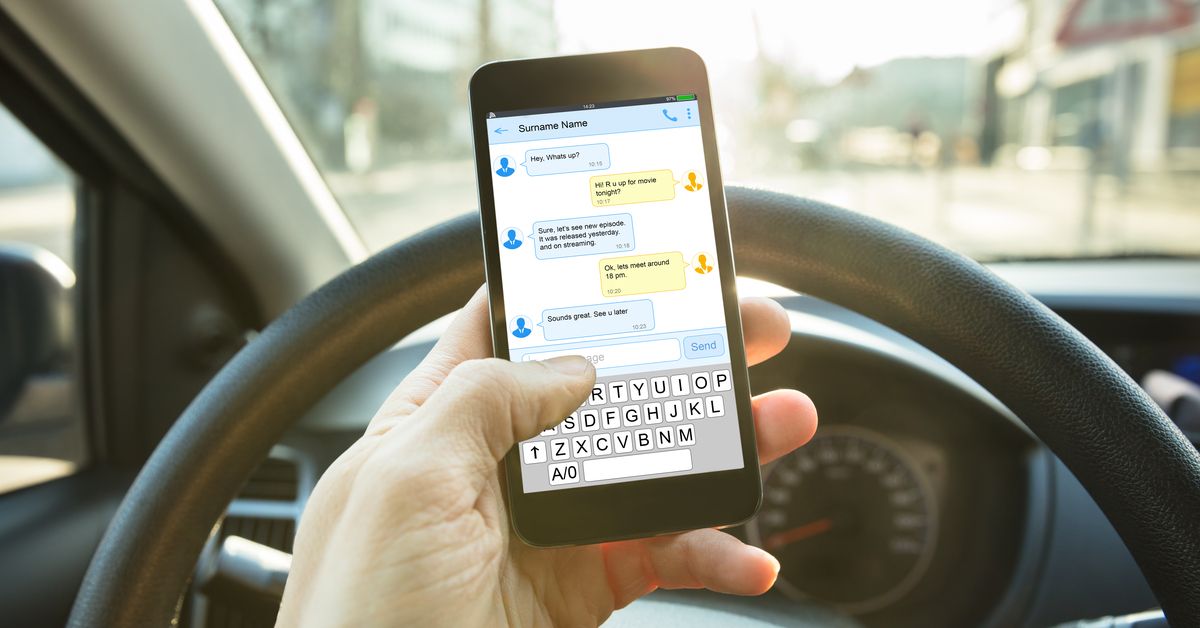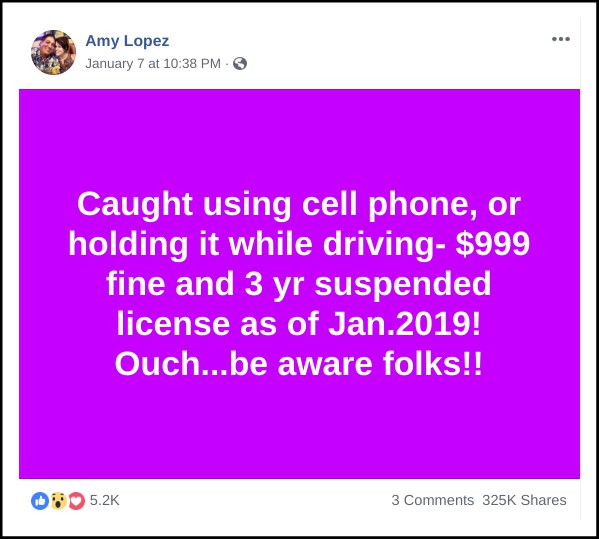A viral message on Facebook claimed that motorists caught using (or even holding) their cell phones while driving would be fined $999 and face 3-year license suspensions due to a new law implemented at the start of 2019:
This message was lacking some important details, such as where this law was supposedly implemented. Although a number of states and countries have started cracking down on distracted driving through the passage of related laws, they do not all specify the same punitive measures for violations of those laws.
This Facebook post appears to be referencing the new distracted driving laws implemented in Ontario, Canada, at the start of 2019, but message still managed to fudge a few details of that law. For instance, drivers in Ontario could face three-day (not three-year) license suspensions if caught using their mobile phones while driving. The size of attendant fines also varies depending on factors such as the type of license an offending driver holds, the length of time they've been driving, the number of previous violations, and whether they choose to fight the ticket in court.
Here are some of the details about Ontario's new law from Ontario.ca:
It’s against the law to use hand-held communication (e.g. your phone) and electronic entertainment devices (e.g. DVD player, e-reader) while driving.
In fact, simply holding a phone or other device while driving is against the law.
If convicted, the penalty you face depends on the kind of licence you hold and how long you’ve been driving.
First conviction:
- a fine of $615, if settled out of court (includes a victim surcharge and the court fee)
- a fine of up to $1,000 if a summons is received or if you fight the ticket in court and lose
- three demerit points
- 3-day suspension
Second conviction:
- a fine of $615, if settled out of court (includes a victim surcharge and the court fee)
- a fine of up to $2,000 if a summons is received or if you fight the ticket in court and lose
- six demerit points
- 7-day suspension
Third and any further conviction(s):
- a fine of $615, if settled out of court (includes a victim surcharge and the court fee)
- a fine of up to $3,000 if a summons is received or if you fight the ticket in court and lose
- six demerit points
- 30-day suspension
We could not find any laws on the books in any jurisdiction that would result in both a $999 fine and a three-year license suspension for those ticketed for distracted driving. However, we did find some other locations that levy fines of $1000 upon distracted drivers.
Using a cellphone while driving in Oregon, for instance, can lead to a maximum fine of $1000 on the first offense. Repeat offenders can also be sentenced to jail time:
A first offense that doesn’t contribute to a crash is a Class B violation with a maximum fine of $1,000. A second offense, or if the first offense contributes to a crash, is Class A violation with a maximum fine of $2,000. A third offense in ten years is a Class B misdemeanor and could result in a maximum fine of $2,500 fine and could be 6 months in jail.
In states such as Illinois, the fines start relatively low (at about $75 for a first time offense) but increase dramatically if the incident results in death or bodily harm:
While most distracted driving consequences in IL include penalty fees of between $100 and $150, punishments may be much more severe depending on the nature of the crime. For instance, first offenders generally need to pay a fine of $75, while drivers who violate the state’s law for the second time must pay $100. After the third or fourth distracted driving ticket, motorists must pay $125 or $150.
However, if a distracted driving accident results in the great bodily harm or death of another individual, then the consequences are much more severe. This type of violation is known as engaging in the aggravated use of a wireless telecommunication device. For instance, these consequences for distracted driving in IL include the following:
If the violation results in a death, then the driver will be convicted of committing a Class 4 felony. Class 4 felonies generally result in a fine of up to $25,000 and/or between one and three years of imprisonment.
If the violation results in great bodily harm, disfigurement or permanent disability, then the driver will be convicted of a Class A misdemeanor. Class A misdemeanors include a fine of up to $2,500 and/or up to one year in prison.
There is no universal texting and driving law. If you're curious about the distracted driving laws in your area, it's best to get your information from a government website and not a social media post.


